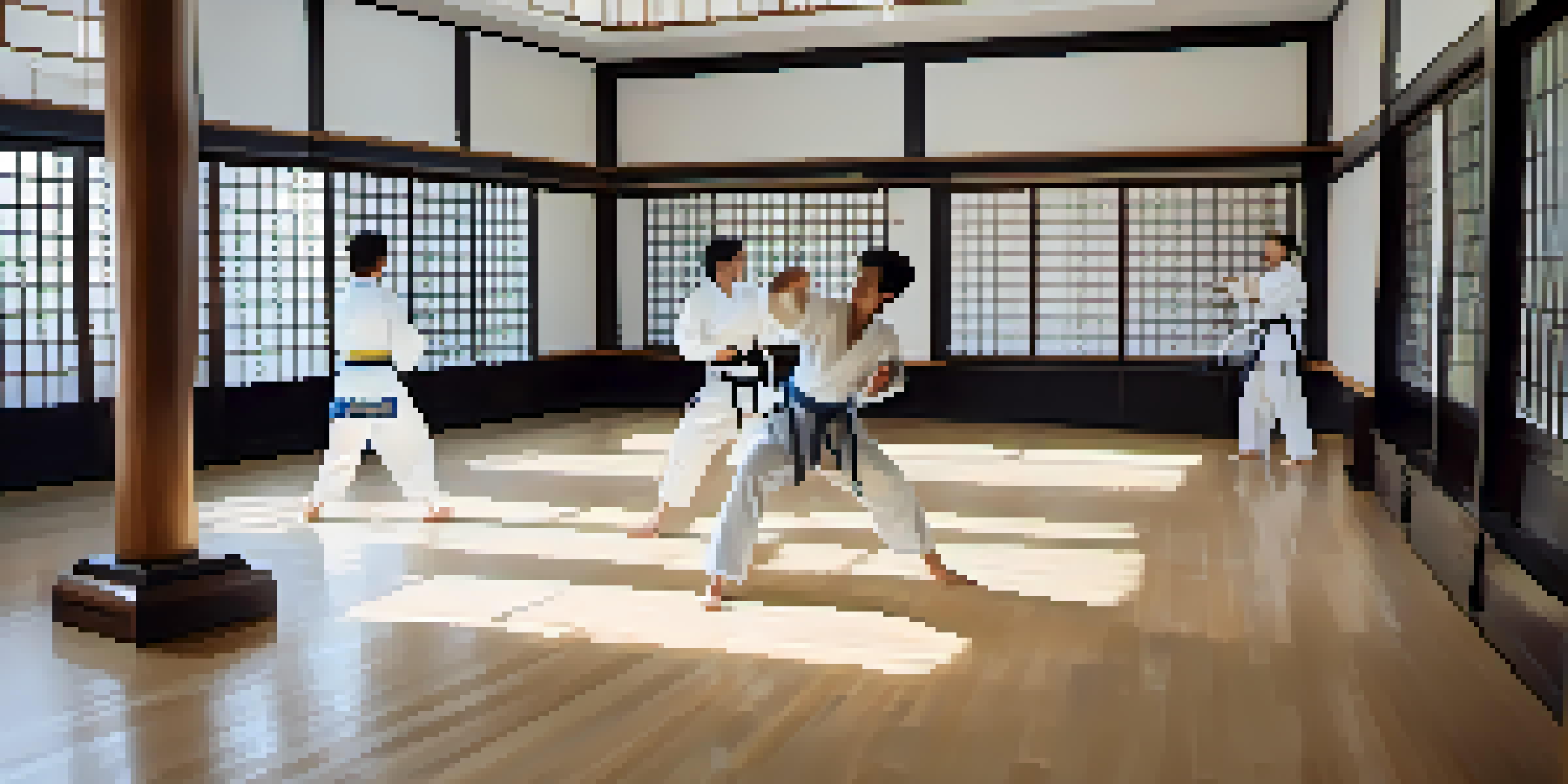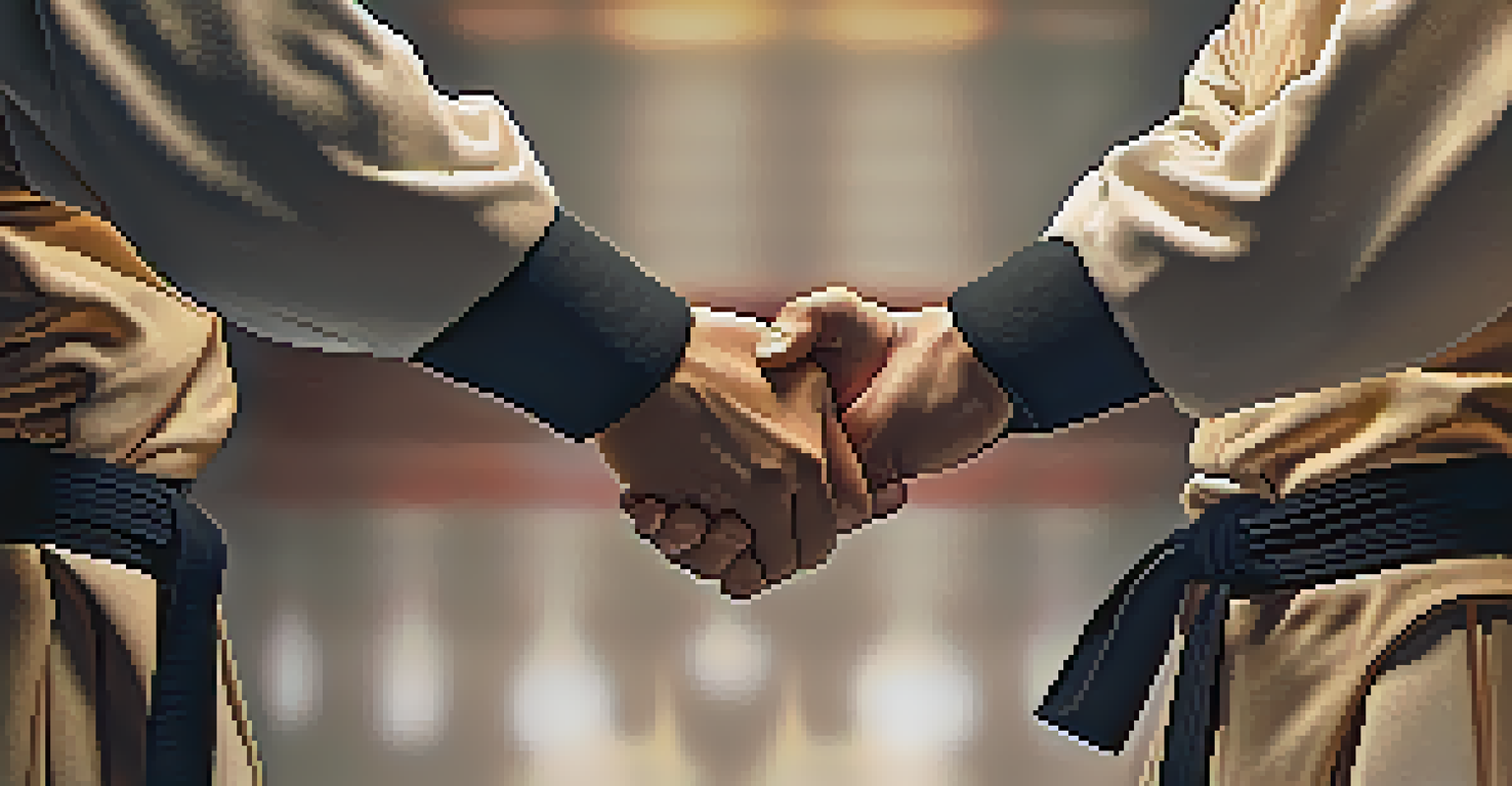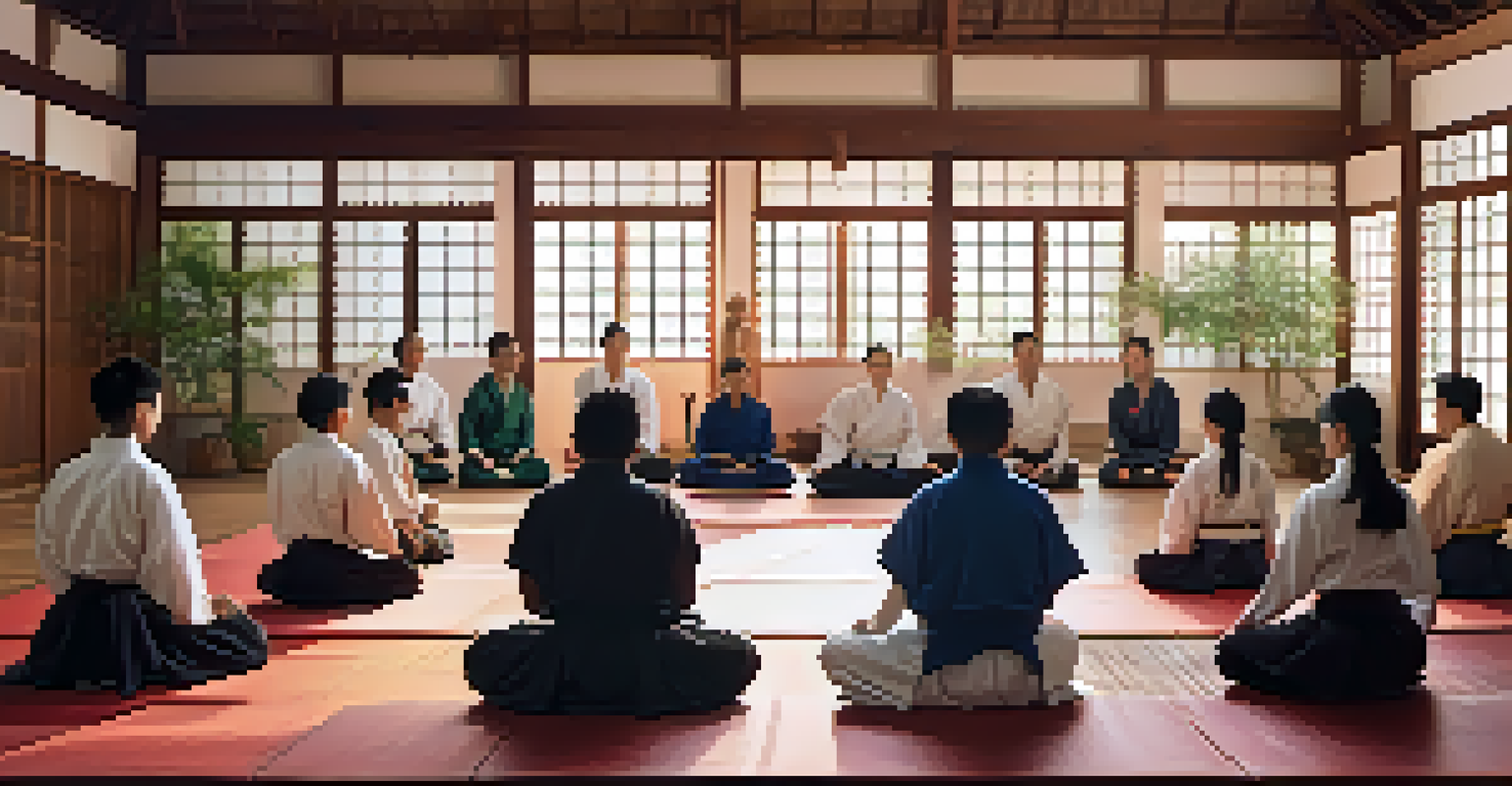How Martial Arts Teach Empathy and Understanding Others

Martial Arts: A Pathway to Empathy
Martial arts are often associated with physical strength and self-defense, but they also offer profound lessons in empathy. Through training, practitioners learn to understand their own emotions and those of others, creating a sense of connection. This journey often begins on the dojo floor, where students engage in partner drills that require them to read and respond to their partner's movements.
The greatest victory is that which requires no battle.
As martial artists spar or practice techniques, they develop a heightened awareness of their partner's feelings and reactions. For instance, a gentle touch in a sparring match can convey support, while a more assertive move can signal a challenge. This constant back-and-forth interaction fosters an understanding of boundaries and respect, both essential elements of empathy.
Ultimately, the practice of martial arts helps individuals step outside their own experiences and consider the perspectives of others. By placing themselves in their partner's shoes, practitioners cultivate a deeper sense of compassion and understanding that extends beyond the dojo.
Learning Respect Through Martial Arts
Respect is a cornerstone of martial arts training, and it plays a crucial role in fostering empathy among students. When practitioners bow to each other before and after training, it symbolizes mutual respect and acknowledgment of each other's efforts. This simple gesture teaches students to appreciate their partner's dedication, regardless of their skill level.

Moreover, martial arts classes often emphasize the importance of respect for instructors and fellow students. By encouraging a culture of respect, martial arts create an environment where individuals feel valued and safe to express themselves. This open atmosphere allows for deeper connections and a better understanding of each other's backgrounds and motivations.
Empathy Grows on the Dojo Floor
Martial arts training fosters empathy by encouraging practitioners to understand their emotions and those of their partners through interactive drills.
As students learn to respect their training partners and instructors, they begin to transfer this respect into their daily lives. Whether in school, work, or personal relationships, the lessons learned in martial arts help individuals approach others with kindness and understanding.
Conflict Resolution Skills in Martial Arts
Martial arts training often involves conflict, whether it's in the form of sparring or grappling. However, these encounters are not merely about winning or losing; they are opportunities to develop conflict resolution skills. Practitioners learn to negotiate, communicate, and find solutions that satisfy both parties, all while maintaining a sense of respect.
Empathy is about finding echoes of another person in yourself.
For example, during a sparring session, a martial artist might find themselves in a challenging position. Instead of resorting to aggression, they learn to assess the situation and communicate with their partner to navigate the conflict. This ability to resolve issues peacefully is a crucial component of empathy, as it requires understanding the emotions and perspectives of others.
Through this process, martial arts practitioners become adept at addressing conflicts in their everyday lives. They learn to approach disagreements with a mindset focused on collaboration rather than confrontation, fostering better relationships and deeper understanding.
Building Community and Connection
Martial arts classes often foster a strong sense of community among practitioners. This communal aspect allows individuals from diverse backgrounds to come together, share experiences, and learn from one another. As students train side by side, they form bonds that transcend cultural and social barriers, promoting a greater understanding of each other's lives.
In many dojos, students celebrate each other's successes and support one another in times of struggle. This camaraderie nurtures a feeling of belonging, which is vital for developing empathy. When individuals feel connected to a group, they are more likely to consider the feelings and experiences of others, creating a more empathetic environment.
Respect Cultivates Deeper Connections
The culture of respect in martial arts promotes kindness and understanding, allowing students to transfer these values into their everyday lives.
Ultimately, the community cultivated within martial arts serves as a microcosm of society. By practicing empathy and understanding in this supportive setting, practitioners are better equipped to bring these values into their wider communities, making a positive impact on the world around them.
Mindfulness and Self-Reflection in Martial Arts
Mindfulness is an essential aspect of martial arts training that contributes significantly to empathy. Practitioners are encouraged to develop self-awareness and reflection through meditation and focused training. This mindfulness practice allows individuals to tune into their own emotions, leading to a deeper understanding of themselves and, by extension, others.
For instance, during a meditation session, martial artists often confront their thoughts and feelings, learning to accept and process them without judgment. This self-reflection creates a safe space for emotional growth, enabling students to recognize how their actions affect others. As they become more attuned to their feelings, they naturally become more empathetic.
By integrating mindfulness into their practice, martial artists cultivate a sense of emotional intelligence that enhances their interactions with others. This profound understanding of one's own emotions allows for more empathetic responses to the feelings and needs of those around them.
Empathy in Action: Real-Life Applications
The lessons learned in martial arts extend far beyond the dojo, influencing how practitioners interact with the world. Many martial artists find themselves applying their newfound empathy in various aspects of life, whether in their personal relationships, workplaces, or community engagements. This ability to understand and relate to others becomes a powerful tool for positive change.
For example, a martial artist may encounter a coworker who is struggling with a personal issue. Drawing from their training, they can approach the situation with empathy and understanding, offering support rather than judgment. This compassionate response not only strengthens their relationship but also creates a more supportive work environment.
Discipline Enhances Emotional Insight
Through discipline in training, martial artists develop patience and empathy, enabling them to better appreciate the challenges faced by others.
As martial artists continue to practice empathy in their daily lives, they inspire others to do the same. Their actions serve as a reminder of the importance of understanding and compassion, creating a ripple effect that can lead to healthier, more connected communities.
The Role of Discipline in Fostering Empathy
Discipline is a key component of martial arts training, and it plays a significant role in developing empathy. Through consistent practice and self-control, martial artists learn the importance of patience and perseverance, qualities that contribute to understanding others. This disciplined approach encourages individuals to be more considerate and empathetic in their interactions.
For instance, mastering a new technique requires time and effort, and students often encounter frustration along the way. In these moments, they learn to empathize with others who may be struggling in their own training. This shared experience fosters a sense of camaraderie and mutual support, reinforcing the importance of empathy.

As discipline becomes ingrained in their training, martial artists begin to carry this mindset into all areas of life. They develop a greater appreciation for the challenges others face, leading to kinder and more empathetic responses in their everyday interactions.